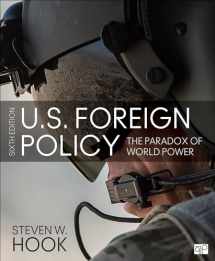
U.S. Foreign Policy: The Paradox of World Power
Book details
Summary
Description
The same aspects of American government and society that propelled the United States to global primacy have also hampered its orderly and successful conduct of foreign policy. This paradox challenges U.S. leaders to overcome threats to America′s world power in the face of fast-moving global developments and political upheavals at home.
U.S. Foreign Policy explores this paradox, identifies its key sources and manifestations, and considers its future implications. Bestselling author Steven W. Hook shows you how to think critically about these cascading developments and the link between the process and the conduct of U.S. foreign policy.
The Sixth Edition highlights global and domestic shifts in the balance of power that affect U.S. foreign policy. It includes essential coverage of foreign policy initiatives under the Trump administration and how they compare to the actions of his recent predecessors. The most pressing question is whether U.S. foreign policymakers can manage these dynamics in a manner that preserves U.S. primacy.


We would LOVE it if you could help us and other readers by reviewing the book
Book review



